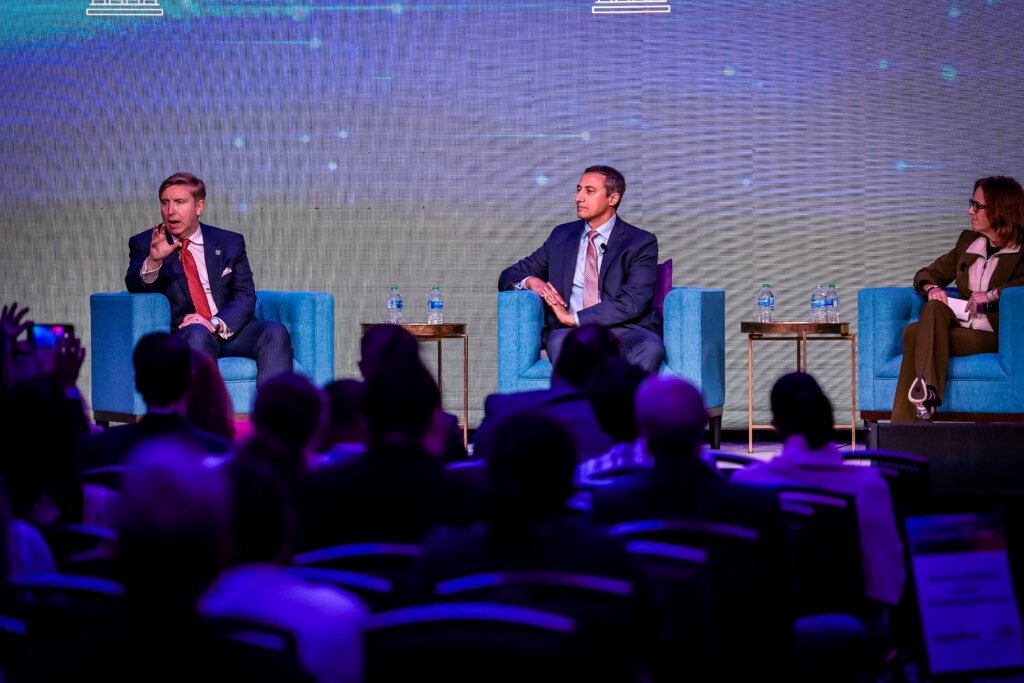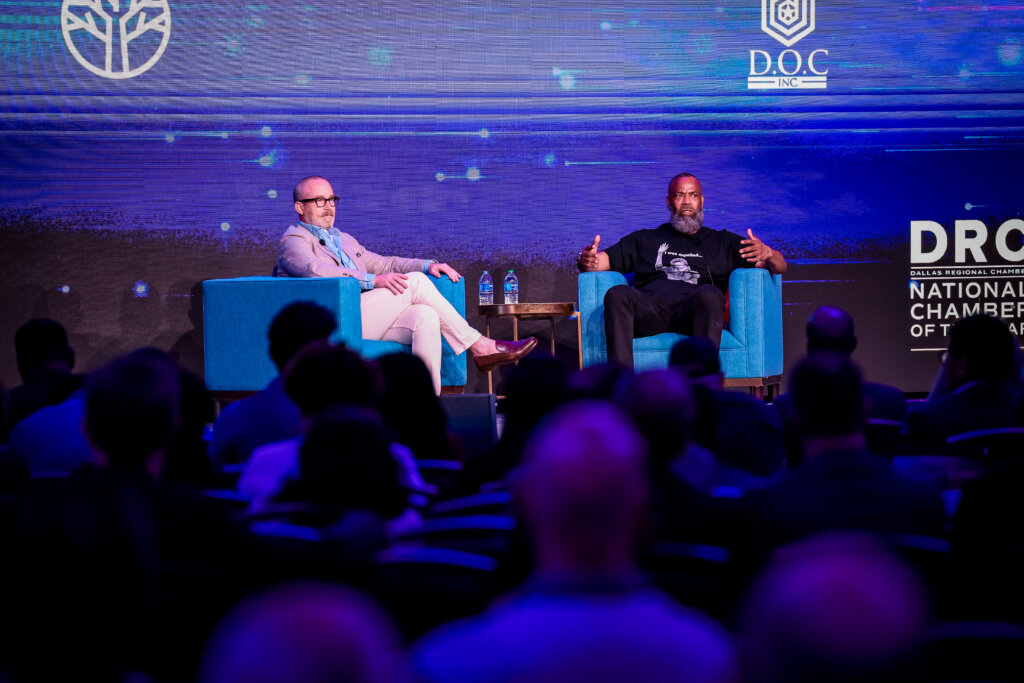By Catie George, Manager, Communications & Storytelling
Artificial Intelligence (AI) is the most recent technological advancement driving and shaping businesses, with some experts saying the AI revolution could be as impactful as the Industrial Revolution.
The Dallas Regional Chamber (DRC) hosted the first-ever Convergence AI Dallas conference at the Irving Convention Center on Thursday, May 2, to address the recent advancements and transformative impact AI has had and will continue to have on business in the Dallas Region and beyond.
“As we all know, Dallas-Fort Worth is positioned to be a hub for business innovation, leveraging technologies like artificial intelligence to transform how companies operate and grow in our region,” said Accenture’s Managing Partner Jorge Corral to kick off the event. “Generative AI is radically changing how work is done and transforming long-standing business processes that are ripe for reinvention.”
Keep reading for the key takeaways of the full-day event, presented by Accenture and Citi.

The AI space is ripe for experimenting, so don’t be afraid to try new things.
“Don’t be worried or scared of experimenting with new things, even if you think it’s small,” said Anchal Gupta, Chief Technology Officer at American Airlines. “The cycle of improvement — it used to be decades, 10 years, or five years. Now the change in technologies is every few months.”
The stunning rate of development is partially due to companies’ dedicated investment in the transformative space.
“The amount of money that’s going into investments in innovation in the space is pretty phenomenal,” said Matt Carbonara, Managing Director of Citi Ventures, “There’s this trend that we’re seeing toward using, instead of the big monolithic foundational models like ChatGPT, to using smaller models that are being specialized for a particular purpose. Why? Because they are many times cheaper to train and faster to train.”
Each company choosing to use AI must make the decision on how they will use the technology.
“We’re primarily interested in solving unsolved problems. That’s where all the energy, excitement, and investment goes: what hasn’t been fixed yet. Let’s solve that, apply that as something, and make that available in its parts or in its whole to people to use,” said Chris Nelson, Director of Segment Sales – Generative AI at NVIDIA. “Our role is to stay ahead of the curve on the research and in learning new things.”
Before companies can dive into AI innovation, they must consider their priorities.
“We have to build that innovation into our initiative portfolio, but we do it with the customer and employee experience in mind,” said Michelle Boston, Bank of America’s Data Management & Enterprise Architecture Executive at Bank of America. “The prioritization process, our vision process, is really about putting the customer experience first, putting the associate experience first, and saying within that constraint budget, what are the most impactful projects that we can build and deliver?”
Legal and ethical considerations are essential to good AI policy.

Attendees heard insights into AI policy and regulations directly from lawmakers, which is valuable as many business leaders wonder what policies Texas will put in place during the 89th Texas Legislature. There are already plans to hold hearings on AI—how state agencies and companies are using it now and their plans for the future.
“We absolutely will put in place an ethical code of conduct for AI in Texas. It’s essential that we do so. My perspective is when Texas leads, when Texas does something right, the rest of the country will follow,” said TX State Rep. Giovanni Capriglione.
Ethical and legal considerations are necessary for AI to thrive in business.
“At the end of the day, I want to maximize the potential of AI for government to achieve greater efficiency for our taxpayers, and at the same time, obviously, to maximize business opportunity for Texans,” said TX State Sen. Tan Parker. “There are also very serious and very real complications and downsides that come from the inappropriate use of AI.”
These ethical considerations in using AI, while drawing more attention, are not new. For example, Microsoft focuses on putting accessibility, transparency, fairness, reliability, and safety processes in place while developing new AI technologies.
“The people developing and deploying AI need to be accountable for what those models can do and how they can be used. And think about that very early on in the development process and not wait until something catastrophic has happened,” said Katherine Gnadinger, Corporate Counsel at Microsoft. “If AI has inclusiveness built into its design at the start, this can help a number of people use AI in a more effective and efficient way.”
Remember to utilize available resources as you develop your own AI strategies.
The emphasis on efficiency due to AI has put pressure on some companies and professionals who now feel like they must “do it all.”
“I think there’s a little bit of AI anxiety, I’m going to say, because you can do all these things… You don’t have to build it all yourself,” said Sarah Urbanowicz, Chief Information Officer at AECOM. “There are technology companies and partners who have very deep pockets in the view of programming… there’s probably a software vendor somewhere right now working very hard on [what you need addressed].”
However, despite the stress new technology can cause, AI is necessary for businesses to progress.
“What I’ve seen is that AI drives improvements,” said John Almasan, Senior Managing Director, Head of Client Tech Labs and AI, Analytics and Governance Tech at TIAA. “Associates with AI are going to be more productive, efficient, and prepared than associates without AI. The ability to bring AI into the hands of everyone and empower everyone in any organization is just going to make us better.”
AI can open doors that were previously shut.
To close out the day, attendees heard from acclaimed rapper The D.O.C., who lost his voice 35 years ago in a car accident and is now using AI technology to reconstruct his voice and return to making music.
“When this technology reared its head, it became something that I was very interested in and something that I wanted to see work and do well because of what I wanted to do,” said The D.O.C. “Because I wanted to hear me again. I wanted to… be able to create the art that I lost 30 years in being able to create.”

In addition to the business case of AI, it is also important to share the more personal effects this technology can have.
“At the heart of our conversation today is this notion that AI can enable new creation of new and driven works that we may never otherwise have an opportunity to experience,” said former American Idol Chief Marketing Officer Chris Gannett. “That’s the use case I’m here to help share today. It’s the human side of AI. It’s an emotional connection to the machine, that human-machine interface.”
Watch the DRC’s highlight video or read recaps from Dallas Business Journal, Gold Sponsor BGSF, and event partner Dallas Innovates.
To learn more about the work the DRC is doing, visit our website. To explore more of our upcoming events, visit our events page.
Thank you to our co-presenting sponsors, Accenture and Citi. Thank you to our Platinum Sponsors: Amazon, Bank of America, Imaginuity, Slalom, Tata Consultancy Services, Thompson Reuters, TIAA, and Walmart. Thank you to our Gold Sponsors: BGSF, Frisco Economic Development Corporation, Locke Lord, Perficient, and Worlds. Thank you to our happy hour sponsor, Munck Wilson Mandala. Thank you to our exhibitor sponsors: 7T, Aible, Axxess, Harness IP, Inclusion Cloud, Ikigai Labs, Juniper Networks, and Sentiero Ventures. Finally, thank you to Dallas AI and Dallas Innovates for their partnership on this event.